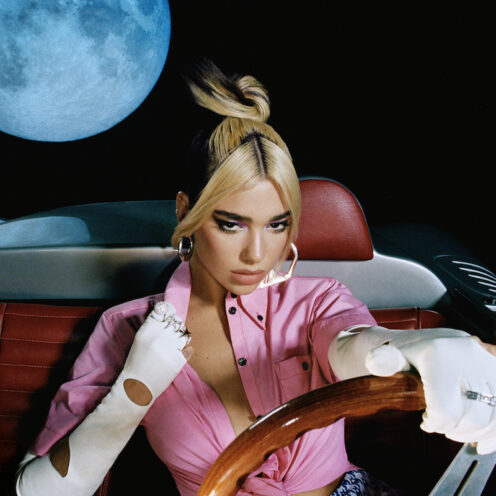
It’s no use explaining what’s happening in the world around us—you already know. Everything we’ve known has been upended and changed forever. We’re still years from discovering what that new normal actually is. It’s heavy, it’s infuriating, and it’s scary: it’s grief. Everything we hold dear—vacations, concerts, healthy daily life—is canceled. There isn’t an end in sight, but there is an abundance of graphs, uncertainty, and fear.
We need an escape. Enter Dua Lipa’s—I’ll go ahead and say year-defining sophomore album, Future Nostalgia. Three years ago, “New Rules” was ever-present on the radio, a top ten worldwide, indisputable Song of the Summer candidate. The US was behind the rest of the world on discovering “Blow Your Mind (Mwah)” and “Be the One,” whose style laid the groundwork for her second album’s sound. However, two 2018 collaborations with Calvin Harris (the tropical house-influenced “One Kiss”) and Silk City (the straight dance-pop of “Electricity”) kept her pop star rising.
When the eponymous title track begins, the first thing that hits you is the sense of funk embodied in every groove. When I played this recently, my mom asked if I was listening to disco. It’s simultaneously a call-back to legendary eras of pop history, and a fresh step forward in our current pop landscape. It gets under your skin, and it’s impossible not to move. The only other artist creating similar music in the mainstream today, to my mind, is Bruno Mars.
It’s in “Future Nostalgia” that Dua Lipa gives us the record’s thesis statement: “You want a timeless song, I wanna change the game/[…]/No matter what you do, I’m gonna get it without ya/I know you ain’t used to a female alpha.” Returning to her tropical-house pop wheelhouse, “Cool” introduces us to how she balances alpha confidence and the insecurities of falling in love. It’s ethereal, a mid-tempo ballad meant for dancing forehead-to-forehead, forgetting everything around you.
The album—year? —highlight comes in the fourth track, “Physical.” Continuing her blending of older styles of pop with an elegant, fresh, modern approach, this track takes late-80s British synth-pop and elevates it to an arena pop anthem that is begging for thousands of voices to scream along with. By the time she arrives at the lyrics in the second verse, “I don’t wanna live another life, because this one’s pretty nice,” even in the Year of our Lord 2020, you believe her—you agree with her.
At this moment, you might become aware of the fact that you’re not thinking about the world. You’re not thinking about pandemics. You’re just dancing. That’s the power of music—of art. We can escape the world around us and truly dive into the beauty and wonder—the joy. In a world where the natural choice would be to turn to despair, another alternative is represented here. An exhale.
The sixth song, “Pretty Please,” channels the sexual self-awareness of later-career Rihanna and Beyoncé. Meanwhile, the next track, “Hallucinate” instantly calls to mind the house music of the late 90s that launched the impossible-to-escape “Zombie Nation.” One of the most impressive things about this album is Dua Lipa’s ability to make every sound a distinct call-back—nostalgia—and an emboldened new take—future. Nowhere is this more apparent than “Love Again”—featuring a slick White Town sample—where the instrumentation pulls you forward and into the song as she faces that she’s falling in love after she believed that was impossible.
The current single, “Break My Heart,” is the most immediate of the songs, with her voice soaring. However, the bass line is a deeply familiar sample of INXS’ “Need You Tonight.” It’s a continued amalgamation of the present and the past, the known and the unknown.
If I was a betting man, “Levitating” will be 2020’s Song of the Summer (alongside “Cruel Summer” if Taylor Swift’s team is smart), if such a thing exists in this crazy year. If “disco beach party” was a sound, this song would be it. However, there’s a single miss: the less said about major album hiccup “Good in Bed,” a Lily Allen influenced cringe piece, the better.
The last song, “Boys Will Be Boys,” doesn’t fit the album—but it’s essential. I’d even go on to say it’s the most vital track of the album. It’s a story-telling ballad, on the nose and yet still not grasped by so many people around the world. “Boys will be boys, but girls will be women/If you’re offended by this song, you’re clearly doing something wrong.” This isn’t a message we should have to be making this far into history, and yet, just like that, as the album ends, Dua Lipa sets us back into the world.
ThroughoutFuture Nostalgia, Dua Lipa is an open book. We know exactly what she’s thinking and feeling at all times. We know her influences: American disco and British synth-pop, throwback and modern. We know her. We’re dancing with her.
The escapism ends, and suddenly, we’re thrown back to our world rampant with sexism, social disparity, wealth inequality, racism, xenophobia—oh, and a global health crisis—again. But there is hope that the world can change, that there is joy, that we’re not alone, that we can still dance. At the end of this year, we’ll remember the albums that helped us carry the heaviness, andFuture Nostalgiashould near the top of everyone’s list.